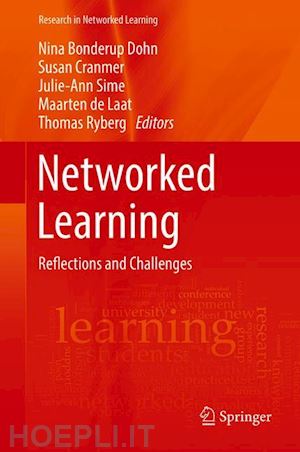
Questo prodotto usufruisce delle SPEDIZIONI GRATIS
selezionando l'opzione Corriere Veloce in fase di ordine.
Pagabile anche con Carta della cultura giovani e del merito, 18App Bonus Cultura e Carta del Docente
The book is based on nine selected, peer-reviewed papers presented at the 10th biennial Networked Learning Conference (NLC) 2016 held in Lancaster. Informed by suggestions from delegates, the nine papers have been chosen by the editors (who were the Chairs of the Conference) as exemplars of cutting edge research on networked learning. Further reviews of all papers were conducted once they were revised as chapters for the book.
The chapters are organized into two sections: 1) Situating Networked Learning: Looking Back - Moving Forward, 2) New Challenges: Designs for Networked Learning in the Public Arena. Further, we include an introduction which looks at the evolution of trends in Networked Learning through a semantic analysis of conference papers from the 10 conferences. A final chapter draws out perspectives from the chapters and discusses emerging issues. The book is the fifth in the Networked Learning Conference Series.
Nina Bonderup Dohn is an Associate Professor in Humanistic Information Science at the Department of Design and Communication, University of Southern Denmark. She holds an MA in philosophy and physics from Aarhus University, a PhD in learning theory from Aalborg University, and a Higher Doctorate Degree in applied philosophy from University of Southern Denmark. She is a member of the Steering Committee of the International Networked Learning Conference. She has been a Visiting Scholar at the Centre for Research on Computer Supported Learning and Cognition, University of Sydney (2013-2014) and at the Department of Philosophy, University of California, Berkeley (2009-2010 and 2000-2001). She currently holds a research grant from the Danish Council for Independent Research on the project Designing for situated knowledge in a world of change. Her main research areas integrate epistemology, learning sciences, web communication and technology-mediated learning with a focus on the role of tacit knowledge. She has published extensively in Danish and English on philosophical and pedagogical issues within knowledge theory, web 2.0, ICT-mediated learning, and teaching and learning in higher education.
Sue Cranmer is a Lecturer in the Centre for Technology Enhanced Learning, Department of Educational Research, Lancaster University, UK. She teaches on the Doctoral Programme in E-Research and Technology Enhanced Learning. Her main research interest are in digital technologies, social justice and in/equality. Sue’s innovative research on disabled children’s uses of digital technologies is becoming increasingly recognised and she is currently working on a monograph entitled: 'Disabled children and digital technologies. Everyday practices in childhood' for Bloomsbury Academic. Sue has led a number of research projects including ‘Expert Perspectives on Creativity and Innovation in European Schools’ for the Institute of Prospective Technological Studies (IPTS) in Spain; and a major work package designing pedagogical scenarios for engaging classrooms as part of the EU-funded iTEC project (http://fcl.eun.org/itec). Other projects have included research into digital inclusion, digital pedagogy, inclusive pedagogical design, digital literacy, digital innovation and universal design. Sue has been widely published within leading journals in the field including ‘Technology, Pedagogy and Education’, ‘Learning, Media and Technology’ and ‘Studies in Higher Education’. In 2010, she co-authored 'Primary schools and ICT. Learning from pupil perspectives' (Continuum) with Neil Selwyn and John Potter.
Julie-Ann Sime is a Lecturer in Technology-Enhanced Learning in the Department of Educational Research at Lancaster University, U.K. She is an experienced online educator who has been tutoring postgraduates in networked learning communities for over 25 years. She researches online and networked learning in professional development focusing on: how new technologies (such as games, simulations and virtual learning environments) can be designed and used to support online educators; how learners can develop an understanding of complex dynamic systems; and how to design for personalized learning experiences so that education is more inclusive. In 2016 she was on the steering committee of the 10th International Networked Learning Conference. With a wide range of experience of European industry/academia collaborative research projects (ETIOLE, A-TEAM, VirRad) and networks (Kaleidoscope, MONET, MONET2), she is currently researching into visual and video literacies of educators and the pedagogy of massive open online courses with funding from ERASMUS+ Strategic Partnership in Higher Education.
Thomas Ryberg is Professor of Digital Learning in the Department of Communication and Psychology at Aalborg University (AAU), Denmark. He is part of the research centre “E-learning lab - Center for User Driven Innovation, Learning and Design”. His primary research interests are within the fields of Networked Learning, Problem Based Learning (PBL), Computer Supported Collaborative Learning (CSCL) and Technology Enhanced Learning (TEL). In particular, he is interested in Problem Based Learning, and how new media and technologies transform our ways of thinking about and designing for Networked and Hybrid Learning. He is co-chair of the International Networked Learning Conference and editor of Journal of Problem Based Learning in Higher Education (JPBLHE). He has participated in European and international research projects and networks (EQUEL, Kaleidoscope, COMBLE, PlaceMe, EATrain2), and in development projects in South East Asia and Latin America (VISCA, VO@NET, ELAC). Currently he is engaged in the EU funded knowledge alliance: Innovative Open Data Education and Training based on PBL and Learning Analytics.
Maarten de Laat is Director of the Learning, Teaching & Curriculum d











Il sito utilizza cookie ed altri strumenti di tracciamento che raccolgono informazioni dal dispositivo dell’utente. Oltre ai cookie tecnici ed analitici aggregati, strettamente necessari per il funzionamento di questo sito web, previo consenso dell’utente possono essere installati cookie di profilazione e marketing e cookie dei social media. Cliccando su “Accetto tutti i cookie” saranno attivate tutte le categorie di cookie. Per accettare solo deterninate categorie di cookie, cliccare invece su “Impostazioni cookie”. Chiudendo il banner o continuando a navigare saranno installati solo cookie tecnici. Per maggiori dettagli, consultare la Cookie Policy.